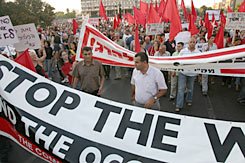Anti-War Minority

In Tel Aviv's Rabin Square on Saturday night, some 2,000 protesters, both Jews and Arabs, held a demonstration against the war, and - unusually in Israel - the country's alliance with the United States. "[Israeli Prime Minister Ehud] Olmert and Bush have struck a deal, to carry on with the occupation," demonstrators chanted.
Others called on Israeli soldiers to refuse to do their duty.
One of the protesters, Prof Galia Golan, acknowledged that opponents of the war are in a tiny minority, but said she expected their numbers to grow. "It's very hard for an Israeli to demonstrate in time of war - the people who are dying and fighting are our kids and neighbours - it's a very difficult thing".
"We saw this in the first Lebanon war of 1982, when it took the public three weeks to react against the war and I think we're going to see the same thing now."
The protesters, some of them teenagers, waved placards and shouted slogans such as "Unconditional ceasefire now" and "Get out of Lebanon", as passing motorists honked their horns in rebuke and yelled abuse out their windows.
Outside one of the city's hotels where foreign media are encamped, a 20-strong group of women gathered to try to generate publicity for their anti-war campaign. The protesters I spoke to said they had received a hostile reaction from other members of the public, but that they were determined to make a stand. "People curse us and call us whores, but it makes me feel stronger to be with people who believe in peace and want to pursue it," said 41-year-old teacher Ornat Turin. "We might be a minority now but the spiral might grow day-by-day."
"The Israeli government thinks by bombing Lebanon they will make peace, but they did it many times before and it didn't work". Yoav Bar says.
